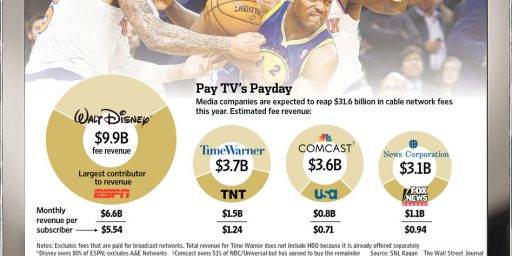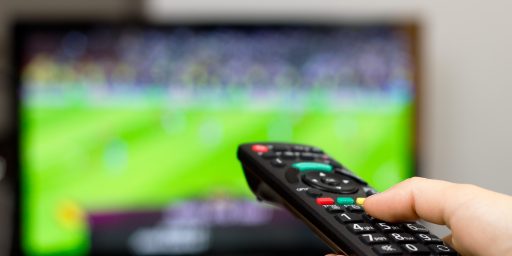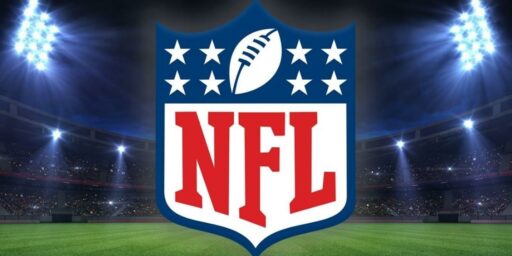Television Monopolies
Megan McArdle refutes the idea that forced bundling by cable television providers (that is, a take-it-or-leave it approach that requires subscribers to pay for 180 channels they don’t want in order to get the twenty they do) really harms consumers. Instead, she argues, “The real problem with cable pricing is not bundling; it’s that cable companies have cozy local monopolies because of a combination of political influence, and the natural reluctance of municipalities to tearing their streets up.”
For many of us, that monopoly advantage is offset by the availability of multiple cable providers, multiple satellite providers, and the launching of the long-awaited service from telephone companies via fiber optic cable. Unfortunately, though, that competition is increasingly offset by exclusivity contracts.
For example, I’ve been a subscriber to DirecTV since moving to the DC area five years ago. Its pricing is competitive with cable and, presumably, limits the ability of the local cable providers to raise prices. Additionally, it comes with the option to subscribe to NFL Sunday Ticket, a package that allows me to see every regular season NFL game (with some annoying caveats).
A few weeks ago, we got FiOS (fiber-optic service) Internet connectivity from our phone provider, Verizon. It comes with the ability to add, as part of a bundling arrangement, what’s reportedly superb high definition television through the same cables. It would not only be cheaper than DirecTV’s product but have much better networking ability than available with DirecTV’s rather inferior HD-DVR system.
Here’s the rub: I’d have to give up NFL Sunday Ticket, which is exclusively licensed to DirecTV, at a very high premium, by the NFL.
Now, I don’t begrudge the NFL the right to sell its product at the highest profit they can achieve. And, in theory, it’s no different than them showing some games, including the Super Bowl, on cable channels that some people can’t get. After all, there’s no right to watch every Dallas Cowboys game (unless you really stretch the Pursuit of Happiness concept). Still, the arrangement leaves me with the choice of staying with a suboptimal television provider, paying twice for redundant service, or missing out several times a year on a very precious, limited commodity (each team is guaranteed only 16 regular season games).
Most major college and professional sports bodies have similar arrangements with some provider. It wouldn’t surprise me if, at some point, other programming moved to a similar model. The end result is a huge drop-off in choices available to consumers.






James, I’ve been thinking of getting DirectTV to get access to the regional Fox Sports Networks primarily for baseball. Of course, this programming competes with the MLB Extra Innings service that DirecTV also sells.
Do you have any idea if they blackout baseball games on the regional networks?
The other thing that is problematic with DirecTV, is that the main ESPN brands are not included with their “basic” plan.
You can pay $30 for basic service and add the Sports pack for around $12. But in order to get ESPN, you have to get the $49 plan.
It seems idiotic.
Odd — I always thought ESPN was part of the basic package. I don’t, so far as I’m aware, subscribe to any sports packages aside from Sunday Ticket.
My guess is that, yes, they black out games on the same basis as those carried in the local market affiliates.
I’ve never encountered that problem with Sunday Ticket, since NFL games tend to sell out. The problem, though, is that they force you to watch games on the local affiliate, rather than Sunday Ticket, if they’re carried. That’s a mild annoyance from a TiVoing standpoint but, more importantly, you can miss out on the opening minutes of a game you’re ostensibly paying to watch if the game before on the network runs long.
DirecTV carries the MASN network for the DC area which gives you all the Nationals and Orioles games with the exception of when they’re carried on the local channel 20 station. Then you have to switch to that channel.
And what is the solution when satellite is unavailable? Apparently there are so many trees in my neighbor’s yard that I won’t be able to get a signal. So I am left with either cable or the broadcast signals. And since the local NBC affiliate stopped broadcasting over the air (it’s gone solely cable), that leaves only ABC, CBS, FOX and PBS. Not much of a choice!
I don’t object so much to the concept of bundling as to the content of the bundles themselves. My wife gets all her weepy women’s channels with no problem but I can’t get any of the sports or hi-def channels without upgrading.
What is the point of bundling cable, when Phased Array Television Antennas drive down the price of everything except a city’s connectivity framework?
A few people will pay a steep premium for sports programming. Of course, for most people the premium price means they stop following the sport at all. The NFL is the only one who seems to be able to make it work.
If the cable companies go to ala carte pricing, most of the cable companies will quickly go out of business. Image that every cable company not only has to develop programing to draw viewer but then will have to convicne the view to spend extra to test watch a new program. Most cable companies will quicly find that they cannot get enough viewers and go out of business.
I also believe that the cable companies will not be around much longer. They have failed to compete with satellite and they are forced to spend resources carrying 15 local access channels that no one watches. The cable companies also have higher fixed costs than cable. My guess is that the phone companies will eventually but the others out of business.
No worries – wait a bit and “the market” will fix it. Once you make the switch you will be part of the market forces that will break the monopoly. It will only hurt for a little bit.
Patrick T. McGuire – don’t be too sure that you cannot get a satellite signal. We lived in Carmel CA, small lots, lots of pine trees, and yet I could hit every satellite I needed to from somewhere on the property. Dish has a higher angle than DirectTV ( bad news on the sunday ticket front, but it is better than nothing). Attach some kind of viewing tube to a tripod and set the angle for the satellite under consideration. Move the tripod around and point the tube at the correct azimuth. If you see sky you are golden. I used a piece of 4 inch pvc drain about a foot long as the viewing tube – much bigger than the actual beam
Look around on the web for the high gain satellite dishes that may solve your signal problem.
I’m not sure how that’s possible, RWB. TV satellites are all geostationary, so they’re all orbiting over the equator at the same altitude. It seems to me that the only way one satellite might be at a higher angle than another would be based on the relative positions of the satellite and the receiving antenna, and not a blanket “higher angle.”
Or am I missing something?
Boyd – the angle issue has to do with the longitudinal position of the satellites. For example, DirecTV’s 3 satellites I’m getting are all positioned near the West Coast longitudes. From where I am on the East Coast, that means they are midway above the horizon facing the southwest (220 degrees from my house). If you’re in California, they’ll sit higher up in the sky directly south. In my case, my satellite signal is sometimes blocked by foliage on one of my trees. I think Dish’s satellites are closer to the East Coast, and one of them is actually facing east, from looking at some of the Dish antennas in my neighborhood.
And that’s my point, DCL. It’s not that Dish’s satellites are generally “higher” than DirecTV’s, it’s just that your location may make one service’s satellites appear higher than another’s, and the advantage will definitely be reversed in a different location.
And thanks for the info on the positioning of the satellites. I was unaware that they were clustered so.
Be careful wishing for the ala cart stuff. Your bill will be immense. I dont think most people know how these costs are set up. ESPN costs your provider from 2.50 to 4.00 PER HOME PER MONTH if its part of a packge deal. ESPN has alredy stated or threatened if you want, that it will be in the neighborhood of 15 to 20 dollars per month as a stand alone program. ALL these popular channls will be in that price range. National Geog, Discovery, Disney will all be 10 to 20 dollar EACH. So you better take a big breath and eat all these crap channels that only cost 10 to 15 CENTS that come bundled. They pay a lot of the freight through their advertising.
ESPN has threatened all the cable companies to go higher prices if they move them from the basic tier of service.
Thanks for the explanation of different apparent angles – I want to add that my sight on Dish was towords the house from 20 feet away, shooting over the roof and under the canopy of a large oak. No one who saw the location of the dish could believe it worked. You cannot use high gain to compensate for signal even partially blocked by leaves. The window MUST be clear, but a narrow window WILL allow a good signal.
Personaly it all seems idiotic. I have never had cable or satalite. I have never been persuaded to pay for more sports than I can get on free TV. I was upset when they switched Monday Night Football to cable but I found other activities to occupy my time. Maybe you guys need to get a life.:-) Watching sports is well and good but don’t let it dictate your finances. What do you guys pay for this extra TV watching anyway? It looks like aywhere from $30 to $65 per month. Whatever it is, spend it on books or green fees or donate it to a local youth sport team instead. I bet if more of you did it would drive the price down.
The reason that NFL Sunday Ticket is exclusive to DirecTV is simply that cable companies weren’t willing to pay what the NFL wanted for broadcast rights, while DirecTV was.
NFL Sunday Ticket was not exclusive to DirecTV when it was launched in 1994, it was also available to C-band satellite customers, and was only discontinued to them around 2002-2003 (Not that there were a lot of customers to begin with, but by then, the number of customers on C-band was probably quite low). Multiple satellite and cable systems in Canada have NFLST as well.